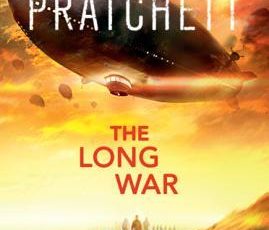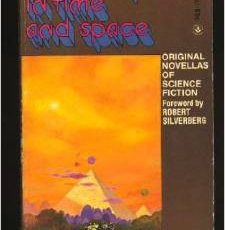This review was originally posted on Goodreads.com and reviews.wheelerc.org on April 4, 2014.
“Three Trips in Time and Space” is three novellas of wildly disparate quality by three different sci-fi stalwarts, commissioned on the idea of instantaneous, economical travel.
Robert Silverberg commissions the three novellas, stories, from three different authors. He sends them the book’s foreword.
(Them are: Larry Niven with ‘Flash Crowd, John Brunner with ‘You’ll Take the High Road’ and Jack Vance with ‘Rumfuddle.’)
The Premise and the Challenge:
The jist of Silverberg’s foreword, his challenge to the authors is instantaneous, economical travel. His words:
“Suppose it were possible, technologically and economically, to transport oneself to any point on the earth’s surface in virtually instantaneous travel? What sort of society would develop where Arabia is an eye blink away from Brooklyn, where one can step from Calcutta to the Grand Canyon between two heartbeats? Let the author, if he can, visualize for us how such a transport system might work – but let him concern himself, primarily, with the effects it would have on the texture on quality of human life. (emphasis added)
There one has it. Instantaneous, economical travel.
The Quick Run Down
1. The first novella, ‘Flash Crowd’ by Larry Niven sets a very good tone. While it lacks in a denouement, it certainly hustles the plot along for most of the story. From a technology standpoint, both it and Brunner’s novella share a conceit of a form of teleportation.
2. The second novella, ‘You’ll Take the High Road’ by John Brunner neither hustles along nor is standable, most notable with its whiney narrator/main character.
3. The third novella, and the strongest by far, is ‘Rumfuddle’ by Jack Vance. Although it’s confusing for the first few pages, it quickly hits its stride and the strong-headed narrator is evened out by a strong plot, strong pacing, a great twist and a great technological concept that propels it far beyond the environs and implications of its two brother novellas.
(more…)
 A fast-paced novel, Clans of the Alphane Moon has a little of everything: a meditation on the civil rights of the mentally ill and the freedom of free will and free agency; the trials of marriage and divorce; the insanity of a paranoid security apparatus.
A fast-paced novel, Clans of the Alphane Moon has a little of everything: a meditation on the civil rights of the mentally ill and the freedom of free will and free agency; the trials of marriage and divorce; the insanity of a paranoid security apparatus.



 Project Pope, while enjoyable, plods all the way to its final moments, which plods itself.
Project Pope, while enjoyable, plods all the way to its final moments, which plods itself.